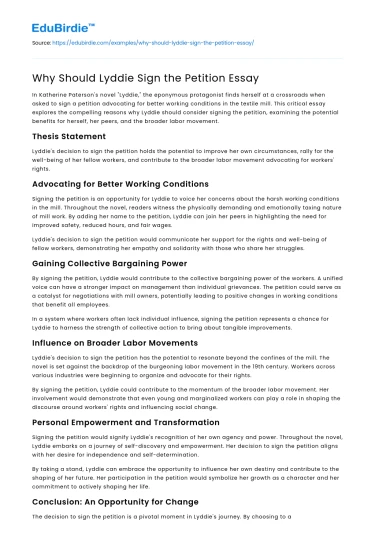In Katherine Paterson's novel "Lyddie," the eponymous protagonist finds herself at a crossroads when asked to sign a petition advocating for better working conditions in the textile mill. This critical essay explores the compelling reasons why Lyddie should consider signing the petition, examining the potential benefits for herself, her peers, and the broader labor movement.
Thesis Statement
Lyddie's decision to sign the petition holds the potential to improve her own circumstances, rally for the well-being of her fellow workers, and contribute to the broader labor movement advocating for workers' rights.
Save your time!
We can take care of your essay
- Proper editing and formatting
- Free revision, title page, and bibliography
- Flexible prices and money-back guarantee
Advocating for Better Working Conditions
Signing the petition is an opportunity for Lyddie to voice her concerns about the harsh working conditions in the mill. Throughout the novel, readers witness the physically demanding and emotionally taxing nature of mill work. By adding her name to the petition, Lyddie can join her peers in highlighting the need for improved safety, reduced hours, and fair wages.
Lyddie's decision to sign the petition would communicate her support for the rights and well-being of fellow workers, demonstrating her empathy and solidarity with those who share her struggles.
Gaining Collective Bargaining Power
By signing the petition, Lyddie would contribute to the collective bargaining power of the workers. A unified voice can have a stronger impact on management than individual grievances. The petition could serve as a catalyst for negotiations with mill owners, potentially leading to positive changes in working conditions that benefit all employees.
In a system where workers often lack individual influence, signing the petition represents a chance for Lyddie to harness the strength of collective action to bring about tangible improvements.
Influence on Broader Labor Movements
Lyddie's decision to sign the petition has the potential to resonate beyond the confines of the mill. The novel is set against the backdrop of the burgeoning labor movement in the 19th century. Workers across various industries were beginning to organize and advocate for their rights.
By signing the petition, Lyddie could contribute to the momentum of the broader labor movement. Her involvement would demonstrate that even young and marginalized workers can play a role in shaping the discourse around workers' rights and influencing social change.
Personal Empowerment and Transformation
Signing the petition would signify Lyddie's recognition of her own agency and power. Throughout the novel, Lyddie embarks on a journey of self-discovery and empowerment. Her decision to sign the petition aligns with her desire for independence and self-determination.
By taking a stand, Lyddie can embrace the opportunity to influence her own destiny and contribute to the shaping of her future. Her participation in the petition would symbolize her growth as a character and her commitment to actively shaping her life.
Conclusion: An Opportunity for Change
The decision to sign the petition is a pivotal moment in Lyddie's journey. By choosing to add her voice to the call for improved working conditions, Lyddie has the chance to impact not only her own life but the lives of her fellow workers and the broader labor movement.
The act of signing the petition represents more than just a signature on paper; it symbolizes Lyddie's commitment to justice, fairness, and the pursuit of a better life. As she weighs her options, the potential for positive change and empowerment lies at the heart of this decision—a choice that holds the power to shape her future and leave a lasting mark on the trajectory of her life and the lives of those around her.






 Stuck on your essay?
Stuck on your essay?

